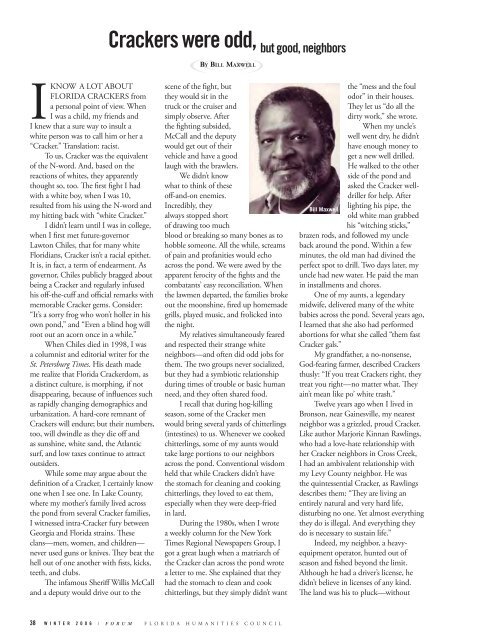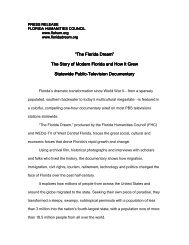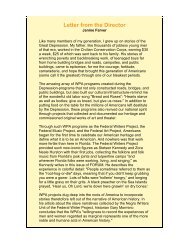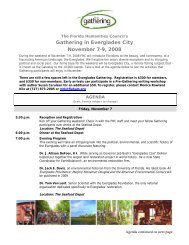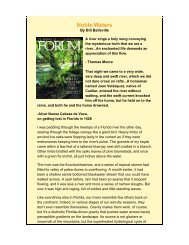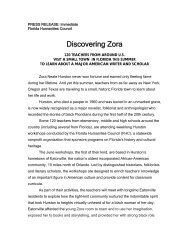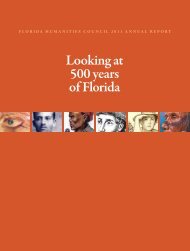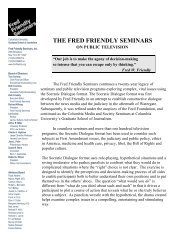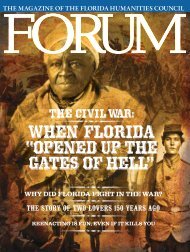THE MAGAZINE OF THE FLORIDA HUMANITIES COUNCIL
THE MAGAZINE OF THE FLORIDA HUMANITIES COUNCIL
THE MAGAZINE OF THE FLORIDA HUMANITIES COUNCIL
Create successful ePaper yourself
Turn your PDF publications into a flip-book with our unique Google optimized e-Paper software.
I<br />
KNOW A LOT ABOUT<br />
<strong>FLORIDA</strong> CRACKERS from<br />
a personal point of view. When<br />
I was a child, my friends and<br />
I knew that a sure way to insult a<br />
white person was to call him or her a<br />
“Cracker.” Translation: racist.<br />
To us, Cracker was the equivalent<br />
of the N-word. And, based on the<br />
reactions of whites, they apparently<br />
thought so, too. The first fight I had<br />
with a white boy, when I was 10,<br />
resulted from his using the N-word and<br />
my hitting back with “white Cracker.”<br />
I didn’t learn until I was in college,<br />
when I first met future-governor<br />
Lawton Chiles, that for many white<br />
Floridians, Cracker isn’t a racial epithet.<br />
It is, in fact, a term of endearment. As<br />
governor, Chiles publicly bragged about<br />
being a Cracker and regularly infused<br />
his off-the-cuff and official remarks with<br />
memorable Cracker gems. Consider:<br />
“It’s a sorry frog who won’t holler in his<br />
own pond,” and “Even a blind hog will<br />
root out an acorn once in a while.”<br />
When Chiles died in 1998, I was<br />
a columnist and editorial writer for the<br />
St. Petersburg Times. His death made<br />
me realize that Florida Crackerdom, as<br />
a distinct culture, is morphing, if not<br />
disappearing, because of influences such<br />
as rapidly changing demographics and<br />
urbanization. A hard-core remnant of<br />
Crackers will endure; but their numbers,<br />
too, will dwindle as they die off and<br />
as sunshine, white sand, the Atlantic<br />
surf, and low taxes continue to attract<br />
outsiders.<br />
While some may argue about the<br />
definition of a Cracker, I certainly know<br />
one when I see one. In Lake County,<br />
where my mother’s family lived across<br />
the pond from several Cracker families,<br />
I witnessed intra-Cracker fury between<br />
Georgia and Florida strains. These<br />
clans—men, women, and children—<br />
never used guns or knives. They beat the<br />
hell out of one another with fists, kicks,<br />
teeth, and clubs.<br />
The infamous Sheriff Willis McCall<br />
and a deputy would drive out to the<br />
Crackers were odd, but good, neighbors<br />
By Bill maxWell<br />
scene of the fight, but<br />
they would sit in the<br />
truck or the cruiser and<br />
simply observe. After<br />
the fighting subsided,<br />
McCall and the deputy<br />
would get out of their<br />
vehicle and have a good<br />
laugh with the brawlers.<br />
We didn’t know<br />
what to think of these<br />
off-and-on enemies.<br />
Incredibly, they<br />
always stopped short<br />
of drawing too much<br />
blood or breaking so many bones as to<br />
hobble someone. All the while, screams<br />
of pain and profanities would echo<br />
across the pond. We were awed by the<br />
apparent ferocity of the fights and the<br />
combatants’ easy reconciliation. When<br />
the lawmen departed, the families broke<br />
out the moonshine, fired up homemade<br />
grills, played music, and frolicked into<br />
the night.<br />
My relatives simultaneously feared<br />
and respected their strange white<br />
neighbors—and often did odd jobs for<br />
them. The two groups never socialized,<br />
but they had a symbiotic relationship<br />
during times of trouble or basic human<br />
need, and they often shared food.<br />
I recall that during hog-killing<br />
season, some of the Cracker men<br />
would bring several yards of chitterlings<br />
(intestines) to us. Whenever we cooked<br />
chitterlings, some of my aunts would<br />
take large portions to our neighbors<br />
across the pond. Conventional wisdom<br />
held that while Crackers didn’t have<br />
the stomach for cleaning and cooking<br />
chitterlings, they loved to eat them,<br />
especially when they were deep-fried<br />
in lard.<br />
During the 1980s, when I wrote<br />
a weekly column for the New York<br />
Times Regional Newspapers Group, I<br />
got a great laugh when a matriarch of<br />
the Cracker clan across the pond wrote<br />
a letter to me. She explained that they<br />
had the stomach to clean and cook<br />
chitterlings, but they simply didn’t want<br />
38 W I N T E R 2 0 0 6 / F O R U M F L O R I D A H U M A N I T I E S C O U N C I L<br />
the “mess and the foul<br />
odor” in their houses.<br />
They let us “do all the<br />
dirty work,” she wrote.<br />
When my uncle’s<br />
well went dry, he didn’t<br />
have enough money to<br />
get a new well drilled.<br />
He walked to the other<br />
side of the pond and<br />
asked the Cracker welldriller<br />
for help. After<br />
lighting his pipe, the<br />
Bill Maxwell<br />
old white man grabbed<br />
his “witching sticks,”<br />
brazen rods, and followed my uncle<br />
back around the pond. Within a few<br />
minutes, the old man had divined the<br />
perfect spot to drill. Two days later, my<br />
uncle had new water. He paid the man<br />
in installments and chores.<br />
One of my aunts, a legendary<br />
midwife, delivered many of the white<br />
babies across the pond. Several years ago,<br />
I learned that she also had performed<br />
abortions for what she called “them fast<br />
Cracker gals.”<br />
My grandfather, a no-nonsense,<br />
God-fearing farmer, described Crackers<br />
thusly: “If you treat Crackers right, they<br />
treat you right—no matter what. They<br />
ain’t mean like po’ white trash.”<br />
Twelve years ago when I lived in<br />
Bronson, near Gainesville, my nearest<br />
neighbor was a grizzled, proud Cracker.<br />
Like author Marjorie Kinnan Rawlings,<br />
who had a love-hate relationship with<br />
her Cracker neighbors in Cross Creek,<br />
I had an ambivalent relationship with<br />
my Levy County neighbor. He was<br />
the quintessential Cracker, as Rawlings<br />
describes them: “They are living an<br />
entirely natural and very hard life,<br />
disturbing no one. Yet almost everything<br />
they do is illegal. And everything they<br />
do is necessary to sustain life.”<br />
Indeed, my neighbor, a heavyequipment<br />
operator, hunted out of<br />
season and fished beyond the limit.<br />
Although he had a driver’s license, he<br />
didn’t believe in licenses of any kind.<br />
The land was his to pluck—without


